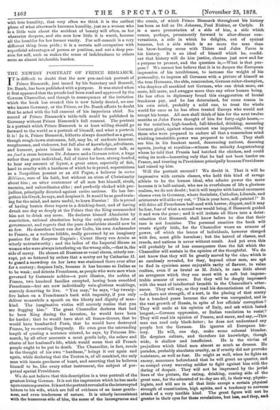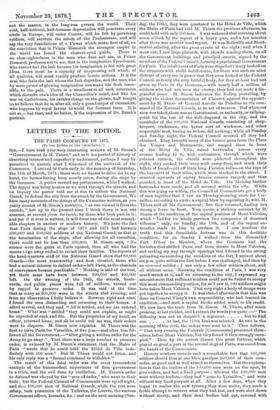THE NEWEST PORTRAIT OF PRINCE BISMARCK.
IT is difficult to doubt that the new pen-and-ink portrait of Prince Bismarck, just issued by his Secretary and Boswell, Dr. Busch, has been published with a purpose. It was stated when it first appeared that the proofs had been read and approved by the German Chancellor, and though in consequence of the irritation which the book has created this is now faintly denied, no one who knows Germany, or the Prince, or Dr. Busch affects to doubt that he acted with the full consent of his imperious chief. No record of Prince Bismarck's table-talk could be published in Germany without Prince Bismarck's full consent. The portrait is a portrait which Prince Bismarck is at least willing should go forward to the world as a portrait of himself, and what a portrait it is ! In it, Prince Bismarck, hitherto always described as a great, though rough-hewn statesman, full, may be, of sardonic humour, roughnesses, and violences, but full also of knowledge, adroitness, and humour, paints himself in his own after-dinner talk, as au fond a cross between Dr. Johnson and a German reiter, a huge rather than great individual, full of thirst for beer, strong-headed, to bear any amount of liquor, a great eater, especially of fish, hard to cruelty with a hardness of which he is proud, superstitious as a Neapolitan peasant or an old Pagan, a believer in sortes Bibliann, sure of his faith, but without an atom of Christianity about him ; an utter contemner of all men but himself, rivals, enemies, and subordinates alike ; and perfectly choked with pre- judices, principally directed against entire nations. He has for- gotten his Greek, he says, and despises it. It would be as good train- ing for the mind, and more useful, to learn Russian ! lie is proud of having beaten three topers in a drinking-bout, and of having drunk one day so deeply at the Palace that the King commanded him not to drink any more. He declares himself Absolutist by conviction, rational absolutism being the only sensible form of government, and regrets that the pure Absolutists should now be so few. He describes Count von der Goltz, his own Ambassador to France, as a verbose fribble, really governed by an imaginary passion for the Empress Eugenie ; Count Harry von Arnim as utterly untrustworthy ; and the ladies of the Imperial House as women who were always interfering on the wrong side,—that is, the side of mercy. He abuses all Russians as venal slaves, utterly cor- rupt, yet so fettered by orders that a sentry set by Catharine II. to guard a snowdrop on her lawn was stationed there ever after for a century; despises Italy, because it has become so Italian as to be weak; and detests Frenchmen, as people who were men when governed by Germanic nobles—a pure illusion, the nobles of France, two hundred families excepted, having been ennobled Frenchmen—but are now individually vain-glorious weaklings, scarcely deserving to live. " You may," he says, "lay twenty- five lashes on a Frenchman's back with impunity, if you only deliver meanwhile a speech on the liberty and dignity of man- kind. The imaginative victim will scarcely realise that you are flogging him." The great Chancellor declares that Lad he been King during the invasion, he would have been far harder; that he would have shot all francs-tireurs, that he would have bombarded Paris, that he would have destroyed France, by re-creating Burgundy. lie even goes the astounding length of quoting a sentence uttered, he says, by Princess Bis- marck, by all other accounts a most gentle lady, the solace and charm of her husband's life, which would mean that all French people ought to be put to death. The Chancellor, in fact, revels in the thought of his own " hardness," brings it out again and again, while declaring that the Teuton is, of all mankind, the only man with innate goodness of heart, and asserting that he believes himself to be, like every other instrument, the subject of per- petual special Providence.
We do not believe that this description is a true portrait of the greatest living German. It is not the impression which he has made upon contemporaries. It is not thepertrait revealed in the intercepted letters to his wife, which are full of evidence of an inner gentle- ness, and even tenderness of nature. It is utterly inconsistent with the humorous side of him, the sense of the incongruous and
the comic, of which Prince Bismarck throughout his history has been as full as Dr. Johnson, Paul Richter, or Carlyle. It is a mere presentation of a aide of him, a side which, comes, perhaps, prominently forward in after-dinner con- versations, a side in which he delights, out of cynical'
humour, but a side which is no more the man than,
his brow-beating scene with Thiers and Jules Favre is- his history. It is an ideal of himself which he, confid- ent that history will do him justice, chooses just now and for- a purpose to present, and the question is,—What is that pur- pose? We cannot but believe that it is to deepen the European. impression of his terribleness, to increase the weight of his personality, to impress all Germans with a picture of himself as the true Hermann, the able, remorseless, German reiter-champion, who despises all mankind not German, who can drink more, eat more, kill more, and swagger more than any other human being.
He has often in diplomacy found this exaggeration of brutal frankness pay, and he has determined, for some reason in his own mind, probably a solid one, to treat the whole world for once as he has often treated Envoys who would not accept his terms. All men shall think of him for the next twelve-
months as Jules Favre thought of him for forty-eight hours,—
as the resistless, high-handed, full-blooded, drinking, menacing German giant, against whom contest was impossible, except by those who were prepared to endure all that a remorseless mind wielding irresistible power was prepared to inflict. They shalt see him in his frankest mood, denouncing nations, damning- agents, jeering at royalties—witness the unlucky Augustenburg whom he told that Prussia had hatched the chicken, and could wring its neck—lamenting only that he had not been harder on France, and trusting in Providence principally because Providence- had raised up him.
Will the portrait succeed? We doubt it. That it will be impressive with certain classes, who hold this kind of savage
athlete to be the human ideal, who admire power the more because it is half-animal, who see in overfulness of life a glorious- realism, we do not doubt ; but it will inspire with hatred enormous classes even in Germany, where Socialists, Catholics, Liberals, and aristocrats will alike cry out, " This is your hero, self-painted r
will drive all Frenchmen half-mad with horror, disgust, and it may be fear, fear of what a second war would bring, if Bismarck guided
it and won the game; and it will irritate all Slays into a deter-
mination that Bismarck shall know before be dies that their race is not feminine. The personal enmities the book will create signify little, for the Chancellor wears an armour of power, off which the lances of individuals, however charged with fire, must glide harmless ; but the hatred of classes, and
creeds, and nations is never without result. And yet even this
will probably be of less consequence than the fall which the Chancellor will sustain in the opinion of the thoughtful. We do-
not know that they will be greatly moved by the 6,Spg which is
so carelessly revealed, for they, beyond other men, are apt to find in cynicism some enjoyable rarity of flavour, to value
realism, even if as brutal as M. Zola's, to care little about
an arrogance which they can meet with a soft but impene- trable armour of scorn. But they will be deeply impressed with the want of intellectual breadth in the Chancellor's utter- ances. They will say, as they read his denunciations of Russia, —Is there not strength, of a sort, in the placing of that sentry
for a hundred years because the order was unrepealed, and in
the vast growth of Russia, in spite of her officials' corruption ? They will smile at his opinion of Italy, and ask which lasted longest,—German oppression, or Italian resolution to resist?
They will read his opinion of France, and sneer, and say,—This man can read only black-letter ; he does not understand any people but the German. He ignores all European his- tory. He will, one day, make some colossal blunder..
He despises culture, and therefore his knowledge, though
wide, is shallow and insufficient. He is the victim a
prejudices which blind men almost as much as dreams. He parades, probably simulates cruelty, as if cruelty did not provoke
resistance, as well as fear. He might as well, when he fights an
enemy, announce beforehand that he will grant no quarter, and so compel every wavering soldier to fight against him with the- daring of despair. They will not be impressed by the jovial lines of the picture, the eating, drinking, roaring side of the great man, for the educated of to-day are all, in their way, physio-
logists, and will see in all that little except a certain physical strength of constitution, high spirits, and a tendency to nervous• attack of a very terrible kind. The great figure will not be greater in their eyes for these revelations, but less, and they, and
not the masses, in the long-ran govern the world. Their cold, half-satirical, half-humane depreciation will penetrate every circle in Europe, will enter Courts, will be felt by governing soldiers, will saturate the minds of the Professorate, and will sap the very foundations of a Power which rests, first of all, on the conviction that in Prince Bismarck the strongest empire in the world has found the clearest-eyed guide. There is no clear-sightedness in the man who does not see, as Prince Bismarck professes not to see, that in the imaginative Frenchman, who cannot feel the lash because his imagination is fed with great ideas, there must be a capacity of suppressing self which, of all qualities, will most readily produce heroic actions. It is the man who feels the lash whom the lash degrades, not the man who by mere power of glowing imagination can make his flesh insen- sible to the pain. There is a smallness in all such utterances which disturbs one's idea of the Chancellor's mind, and like his war on Catholicism, his cavalry charge on the ghosts, half tempts its to believe that he is, after all, only a grand major of cuirassiers, who happens by royal favour to wield the German force. It is not so,—but that, and no better, is the impression of Dr. Busch's portrait.



































 Previous page
Previous page